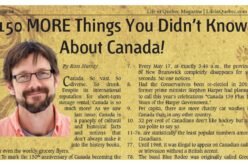 The summer 2016 issue of Life in Québec Magazine is out now priced $3.00+taxes and available for purchase here:
The summer 2016 issue of Life in Québec Magazine is out now priced $3.00+taxes and available for purchase here:
Where to buy Life in Québec Magazine
By Michael Bourguignon
I love language, and I love comedy. The late comic George Carlin’s classic monologue known as ‘the seven dirty words you can’t say on television’ was a childhood favourite that put a hilarious spin on our sometimes puritanical view of the awesome power of words.
Carlin’s filthy rants had as much influence on my understanding, respect and adoration of the English language as have the works of Shakespeare, Wilde, Thompson and Capote – each a master of the written word in his own way.
These gentlemen – along with a few ladies like Dorothy Parker – were not afraid to bend the language to their will, to see how far they could take it. Or, more accurately, how far it could take them.
Despite their disparate literary styles, all of these linguistic artistes had at least one thing in common: they all pissed some people off at one point or another, for one reason or another.
Sticks and stones can break our bones, but words? Words can soothe, sway, enrage, outrage and topple nations. They have an inherent, almost preternatural ability to provoke any and all possible reactions on the human emotional spectrum.
And they can hurt like hell.
I was born in Ottawa and lived in Gatineau at the dawn of the 1970s, in the belly of the beast of Québec’s burgeoning linguistic tensions. Of course I have no recollection of the October Crisis or any of the other seminal events of those troubled times. But I’ll never forget the bullies.
As I recall, my father, a bilingual Outaouais francophone, and my mother, a unilingual anglophone of proud Irish descent, spoke to their three boys at home almost exclusively in English.
By the time I was thrown into a French kindergarten at the age of 5, my French was roughly at the level of ‘oui, non, toasteur.’ I muddled through well enough, learning the language along the way, but it wasn’t long before the crueler kids figured out that I was somehow different.
It didn’t help that I was intensely shy as a child. Well, I mean it didn’t help me. It certainly seemed to help the bullies fine-tune their selection process.
Denis, Paul, some kid I only knew as Blondie, Ti-Guy, Rodrigue … These were some of my designated bullies over the course of my formative primary-school years, along with an assortment of lesser wannabes who also saw the opportunity to take a shot now and again.
Being surrounded in the schoolyard, pinned against walls and fences, pushed to the ground and called names on a recurring basis starting at the tender age of 6 or 7 is no way to grow up.
And yes, 40 years later, the psychological scars are still there. Therapy, self-awareness, self-confidence despite my childhood traumas, and a healthy, absurdist sense of humor (thanks again, George!) have shaped me into a reasonably well-adjusted adult, if a bit quirky.
But the vulnerable little boy inside still suffers every day.
No one has ever addressed that particular child’s enduring pain and sadness on the evening news, but thankfully, the same generation that eventually figured out that some of the playground equipment we grew up with would almost surely kill us have begun in recent years to openly talk about the devastating and long-lasting impact of bullying.
Often, the bully’s weapon of choice is no more than a balled-up fist that is all bark and no bite, backed up only by cruel words. Just words. Often, just words are all you need to crush a soul.
So here we are in 2016, and Mike Ward is called to face the Québec Human Rights Tribunal because a young and vulnerable Jérémy Gabriel felt crushed by the stand-up comic’s words, spoken onstage and rebroadcast ad nauseam for all the world to hear.
Do Mike Ward’s choice and use of words make him a bully? No. They make him a stand-up comic. As you’ll read Ward explain elsewhere in this issue of Life in Québec Magazine, a comedian’s job is to be funny, not to be nice.
Should he be censured or censored for uttering words that may have offended some and almost certainly cut deep into the soul of young Jérémy Gabriel?
That’s the insanely difficult question the Québec Human Rights Tribunal has been given to answer.
The little boy in me, like the child who still resides in many of us, can identify with Jérémy, but the question on the table is so much broader than that. Words can topple nations, but the suppression of words can rob us all of our basic humanity.
I do believe that one person’s rights end where the other’s begin, and, again, I am well aware of the power of words to harm or heal … but I wouldn’t want to be the one called upon to cast the deciding vote in this case.
Would you?
About Author
Write a Comment
Only registered users can comment.











